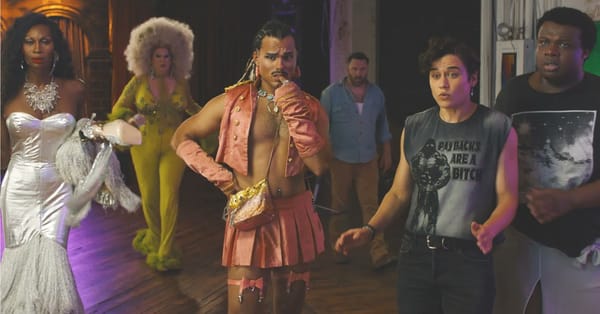Ex Machina, Her, Predictive Filmmaking, and an odd twist.


I’m usually thrown off at the IMAX. Too Loud, too big. Some people need that, but with me, it’s like sending an unnecessarily large voltage through very sensitive equipment.
Ex Machina in IMAX is elite.
What I’ve always enjoyed about the film is that a) I agree with the thesis, and b) it nails consequences. There’s no “oh, look, a thing that happens”, it’s also, “and we’re gonna nail that sucker. Fuck that guy”. It’s also the imperfect perfect ending. I don’t see the function in creating a critical film that merely sits and says !!Thing Bad!!, if it makes no effort to untangle the premise, the badness, and find some resolution to it.
Rewatching it almost, almost, convinced me to watch 28 Days Later.
I have only ever watched this film in Alex Garland’s body of work, but it’s one of my favourites of all time. If it’s Sci-Fi, it’s also revenge fantasy, it’s a takedown of the Tech Bro class, and their hubris — and ultimately, in hindsight, in many ways, the film was predictive.
I have been clowning on Her for literal years.
Mind you, I make sure to caveat with, ‘I haven’t watched it, buuuut’, and if anyone gets mad at me, I simply remind them that Film Bros do this constantly, so I’m allowed a freebie.
Most of the clowning was, quite simply, that the poster said ‘Her’, and the face was decidedly Joaquin Phoenix, which gave the impression, to me, that it was another one of those stories about centering the male experience of love, disembodying and dehumanising Women Partners, and a self-indulgent foray into Android femininity.
It wasn’t not those things, but it was some of those things in a good way.
Her was a beautiful, visual, incredibly romantic film - both in the sense of romance and the sense of a Romantic approach to the story. Nothing goes terribly wrong. It’s an interpersonal drama where one of the people is a super-AI. There is commentary, but not the Garland kind - more the kind that can only happen when you’re telling the quiet truth about human love. None of the female characters feel badly drawn, and I was deeply surprised by this. Stunned, one might say, at how well it was all handled, but also, how intelligently.
I think there are so many elements of Her that seek to be optimistically Predictive. I truly hope the future looks more like Her and feels less like Ex Machina. I think we have to go through Ex before we get to Her, but both futures can be true, both futures have truth to them.
Artificial Intelligence in film provides the same axis as the apocalypse — to reflect the now. So, the AI depicted tends to reflect what we, as a society, are grappling with at the higher levels, as AI has the upper limit of brain function (Computing) to work with. AI made to mimic humans, especially, tends to also be used as foils for the human failing, the human changing, the human impulse (the violence of the final scene of Ex, the outgrowing of the relationship in Her).
It’s also hard to miss the ways that AI stories veer into discussions around Autism without knowing it. I’m simply going to look this phenomenon in the eye, I’m not going to run from it — both films center Autistic Human characters, and both films end up, by proxy, teaching socialisation to a machine outside of humanity, meant to mimic humanity, therefore making Autistic AI’s. That’s just simply what happens, again and again, by virtue of the definition and diagnostic criteria of Autism.
Interesting, then, that most AI stories seek to build women from scratch, and end up building Autistic women.
The trope of the Manic Pixie Dream Girl (PLOT TWIST! Bet you didn’t see this one coming!) has, since inception, been parallel and linked to the discussion around the presentation of Autism in people that are not Cis Men -- but especially in this case, 'Girls'. To remind you - the MPDG has some or all of the following traits;
- quirkiness, expressiveness, freedom (Or, put another way, a lack of awareness, or rebellious defiance, as to how they are being perceived)
- fragility, volatility, self-destructiveness (Or, put another way, Emotional Lability, or deficit of Emotional Regulation)
- and she must serve to coax the male protagonist into a life of adventure (Or, put another way, the male protagonist is reluctant to be more social, and less encumbered — perhaps, he too, may be on the spectrum.)
I have always loved MPDG characters, but I’ve hated the context they were assigned, and the lack of agency they have in their own stories. When an MPDG is given leeway to be human and to rebel somewhat against the role of ‘saving a guy’, I think some amazing stories are told.
So what of the MPDG AI? Lily, in Ex, is definitely one, especially if you take a humanistic approach to her, quote, “manipulation”, and you don’t disregard the manipulation of Nathan within the story, as Nathan would want you to. For a computer, her moves seem irrational near the end, but a re-reading of her in this light shines on a more sympathetic path of logic.
Samantha, in Her, is straight down the line, and this is what I enjoy the most about the film; she is framed, without any apology, first and foremost, as an AI to help Theodore out. There’s no default mother, default girlfriend, or default caregiver “but we don’t name it” here — it’s all out in the open. So her evolution makes her the true hero of the journey we take.
I will end where I always end - this trope needs turning inside out if it’s going to have been truly and thoroughly excavated for the worth it has to give us.
Don’t worry. I’m working on it.





